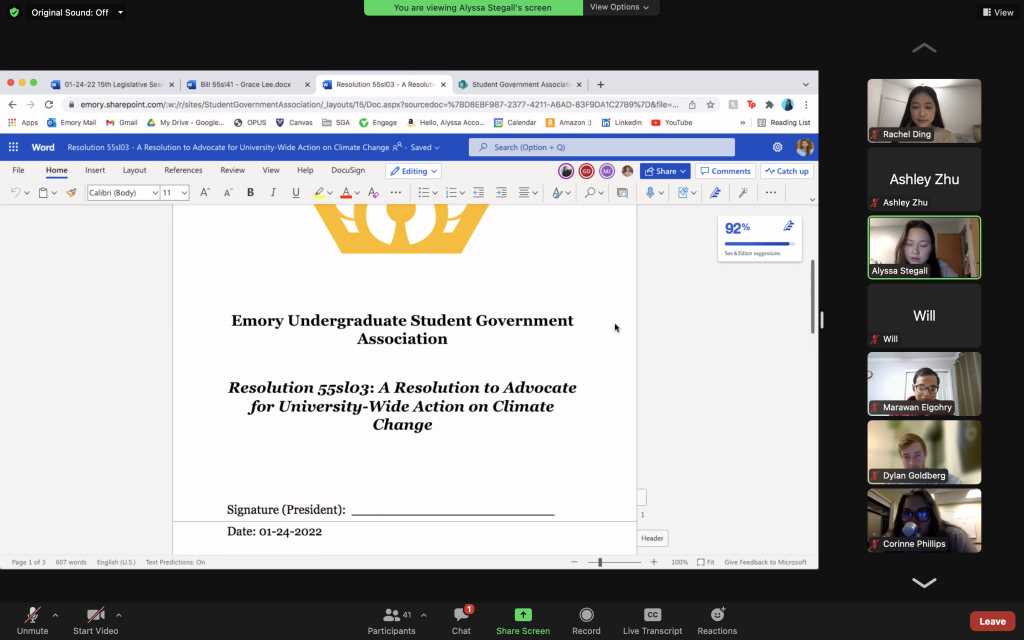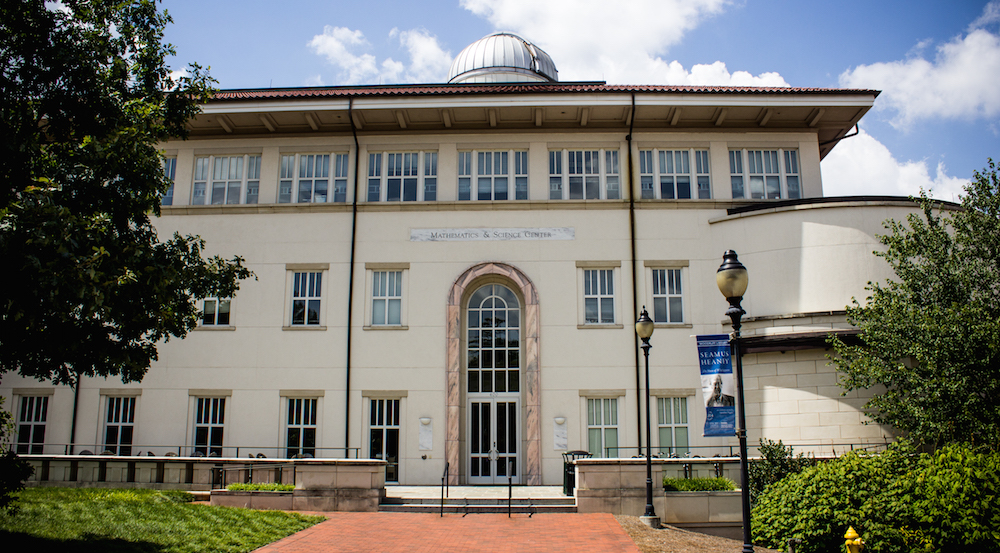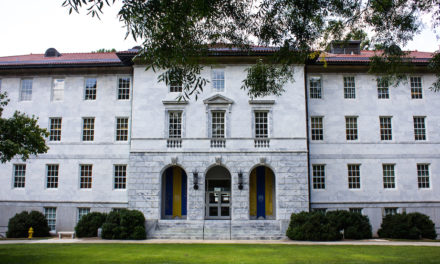During the first Student Government Association (SGA) meeting of the spring semester on Jan. 24, Emory Climate Coalition (ECC) representatives Eleanor Partington (22C), Ben Levitt (22C) and Jack Miklaucic (23C) proposed “A Resolution to Advocate for University-Wide Action on Climate Change.”
The resolution listed a number of demands to the University administration, including the investment of the “entirety of the University’s multibillion dollar endowment in funds that align with the United Nations Sustainable Development Goals” and the official declaration of a “global climate emergency.”
“The climate crisis is the biggest global emergency that we are currently facing and will continue to face,” Levitt said. “This crisis has really disparate impacts on particular communities, especially Black, Indigenous and People of Color. Understanding that this climate crisis is linked to social justice makes it really important as an institution to act.”
ECC held a climate strike last September and got University President Gregory Fenves to sign onto two climate-related organizations: the Climate Leadership Network and Race to Zero.
The success of the coalition’s progress has rested on the observation that the University takes action when students have stepped up to make things happen, Miklaucic said.
“Some of the specifics in this resolution, including changing our investments and reducing our emissions far sooner than 2050, are still not things the University has necessarily agreed to,” Miklaucic added. “We want to ensure that we are continually building momentum.”
Assuming that the resolution is passed, the ECC’s priorities would include increasing funding and seeing the University’s commitments turn into action, according to Levitt.

At the first SGA meeting of the semester on Jan. 24, the Emory Climate Coalition proposed “A Resolution to Advocate for University-Wide Action on Climate Change.” (Ashley Zhu)
“As we start to schedule future meetings with important decision-makers like [Vice President of Campus Services] Robin Morey and President Fenves, having this resolution would give us the weight and backing of the entire student body to turn those commitments into tangible action,” Levitt added.
SGA President Rachel Ding (20Ox, 22B), however, said the resolution was vague and lacking in detail in regards to finances and investments.
“I would love to hear more from Emory’s CIO and CFO before SGA makes a broad statement on the endowment,” Ding said. “I think we should have conversations about how the University should invest in general. The office of the CIO is in charge of the endowment, so I would be interested in talking to them first.”
Ding said that the resolution would be more valuable to the University administration without the endowment phrase, which aims to direct the entirety of the multibillion dollar amount “in alignment with” UN Sustainable Development Goals, which includes — but isn’t limited to — causes like good health, quality education and gender equality, as well as environmental causes such as clean water and climate action.
Former Oxford SGA President Eleanor Liu (21Ox, 23C) also highlighted the importance of discussing financial issues with the offices that have professional experience dealing with money.
“It’s very easy to attack the University on its finances when we’re not fully informed,” Liu said. “I understand concerns about lack of transparency — we don’t know where finances are invested — but to pass something where we’re not fully informed of its implications is kind of a jump ahead.”
Other meeting highlights included the results of a COVID-19 survey, which was sent out to students over winter break and received more than 300 responses.
“We learned a few things: mainly that the past year online was very mentally depressing and academically disengaging for students,” Ding said. “In general, we learned that students were dissatisfied, but overall there is a lot of misunderstanding and misinformation about the university’s finances.”
Additionally, SGA Executive Vice President Aditi Vellore (21Ox, 23C) mentioned the lack of accommodations for international students and those in different time zones, who are taking the same online classes as those on campus.
“We are looking to address these problems with the Provost in the future,” Vellore added.
Correction (2/24/22 at 3:05 p.m.): A previous version of this story gave an incorrect date for this SGA meeting, which occurred on Jan. 24.
Correction (2/24/22 at 3:10 p.m.) A previous version of this story stated that Miklaucic said the Office of Sustainability Initiatives responded to student demands when it was, in fact, more broadly University leaders such as President Gregory L. Fenves.
Correction (2/24/22 at 3:12 p.m.) A previous version of this story stated that the endowment phrase of the Emory Climate Coalition’s resolution advocated for an investment in environmental funds. In fact, the resolution advocated for investment in accordance with the UN Sustainable Development Goals, which includes other initiatives besides environmental causes.
Ashley Zhu (she/her) (25C) is from Dallas, Texas, majoring in biology and minoring in sociology. She is the vice president of recruitment for the Residence Hall Association, a sophomore advisor for Raoul Hall and a staff writer for the Emory Undergraduate Medical Review. She is involved in cell biology research at the Pallas Lab and is a BIOL 141 Learning Assistant. Zhu enjoys FaceTiming her dog, stalking people's Spotify playlists and listening to classical music in her free time.







